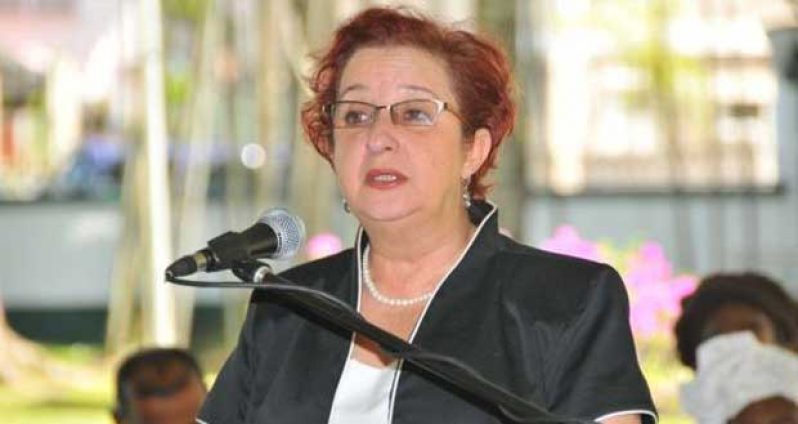–FATF ‘likely to make a decision’ today or tomorrow
PRESIDENTIAL Adviser on Governance, Gail Teixeira, yesterday told the Guyana Chronicle that the Financial Action Task Force (FATF)’s International Cooperation Review Group (ICRG) has completed a preliminary review of Guyana’s Anti-Money Laundering and Countering the Financing of Terrorism (AML/CFT) framework.
She said the international watchdog is expected to make a pronouncement either today or tomorrow. “Right now we are learning as we go… FATF is likely to make a decision, based on ICRG’s first review,” she told the Chronicle by phone from Paris.
Teixeira is currently in the French capital representing Guyana, following the nation’s referral to FATF by the FATF-Style Regional Body (FSRB), the Caribbean Financial Action Task Force (CFATF) on May 29.
Guyana was also regionally blacklisted in November by CFATF, and after its May 29 recommendation, the body called on its member countries to implement counter-measures to be taken against Guyana. The range of onerous measures include: Enhancing due diligence measures in their dealings with Guyana; introducing enhanced reporting mechanisms, or systematic reporting of financial transactions; refusing to establish subsidiaries or branches or representative offices in Guyana; and taking into account the fact that financial institutions from Guyana do not have adequate AML/CFT systems, and thus limit the business relationships or financial transactions with this country.
The enactment of the AML/CFT (Amendment) Bill before CFATF’s meet in May, by all accounts, could have averted Guyana’s referral to CFATF, particularly since the body had noted that 90 per cent of the deficiencies identified are legislative in nature.
The Bill, to meet CFATF’s requirements, was tabled in the National Assembly in April 2013, but referred to a Parliamentary Special Select Committee and eventually voted down by the combined Opposition in November 2013. The Bill was re-tabled in December 2013, and again referred to the Parliamentary Special Select Committee, chaired by Ms. Teixiera, where it has been since.
Government has repeated it willingness to have the Bill passed, and has demonstrated its commitment to same, but has been locked in political gridlock with the combined Parliamentary Opposition, A Partnership for National Unity (APNU) and Alliance for Change (AFC).
Both Parties have linked conditionalities to their support for passage of the AML/CFT (Amendment) Bill.
APNU proposed three amendments, which were included in the Party’s draft amendments to the Principal AML/CFT Act, which President Donald Ramotar said would be supported by his Government if the Party would agree to pass the AML/CFT (Amendment) Bill. This was rejected.
APNU’s position is an ‘all-or-nothing’ one, as the Party maintains its demands not only for their Bill, but also restated its call on the President to give his assent to several Bills passed in the National Assembly, including the Local Authorities (Elections) (Amendment) Bill 2013, which states that elections must be held on or before August 1, 2014. The Head of State has already forwarded his explanation for his-non assent to the National Assembly.
On the other hand, the AFC, which is fully behind APNU’s position, is demanding the establishment of the Public Procurement Commission (PPC), which the government has agreed to, providing that Cabinet retains its no-objection role in the process; but the latter position has been rejected by the AFC. However, on May 29, after the announcement by CFATF, the AFC, in a statement, noted that it is now willing to budge on its position, and support Cabinet’s retention of its no-objection role.
Additionally, FATF’s new Methodology for assessing technical compliance with the FATF Recommendations and the Effectiveness of AML/CFT systems sets out how the FATF will determine whether a country is sufficiently compliant with the 2012 FATF Standards, and whether its AML/CFT system is working effectively.
FATF is the global standard-setter in the fight against money laundering, and the financing of terrorism and proliferation of weapons of mass destruction, and over the past 20 years, the organisation has developed, used, and refined rigorous compliance mechanisms to help ensure global compliance with its Standards. FATF sets standards and promotes effective implementation of legal, regulatory and operational measures for combating money laundering, terrorist financing and other related threats to the integrity of the international financial system.
The international body is expected to publish a summary of the outcomes at the end of it ongoing plenary meeting, which started on Monday.
(By Vanessa Narine)



.jpg)








